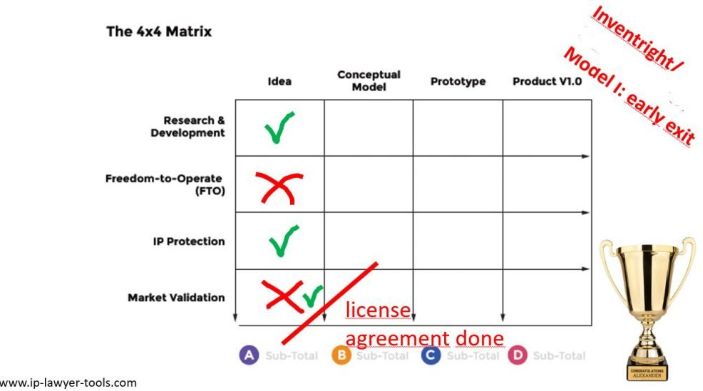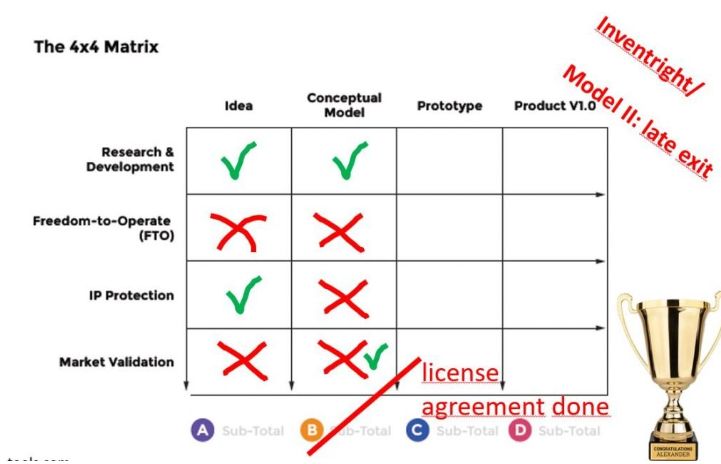This is where I am coming from: I found this old article of Stephen Key "Stop Taking Business Advice From Your Patent Attorney!"
Key is one of the authors of my website here and we have met several times at various conferences. And yes, by writing an article with such a title, Key is poking into my eye because I am a patent attorney, and of course do I give successful business advice. Just look up the numerous recommendations of my clients in my LinkedIn profile (click here).
I highly estimate Key because he has a grasp of innovation from a very practical point of view. And Key and I share at least one personality trait: we both started out in our lives as innovators. The main difference between Key and myself is that while Key switched to advising other innovators in making their innovation successful from a business point of view, I specialized in the Intellectual Property (IP) aspect of innovation. As you know from my publications, Innovation consists of the four areas R&D, Freedom-to-Operate, Intellectual Property (IP), and Market Response Testing. While Key's main business is about teaching tactics and plans to be successful in innovation, my main business is about IP and how you can make sure that you build a fence around your successful product, thereby protecting yourself from your competition entering your business "Blue Ocean" and turning it into a "Red Ocean". Key's and my main areas of practice are linked in a complementary way, but we are not competing on the same level of the innovation services value chain. I am actually even recommending Key's books to sole inventors, especially his book "Sell Your Ideas With or Without A Patent".
Key's Weird Encounter With Patent Attorneys
But now to Key's article. Let's find out what made him so aggressive.
This is the customer experience that Key shares with the reader:
When I shared my first 'big' idea with my Silicon Valley patent attorneys, they absolutely loved it. I ´... would never be able to count all the income it would generate ...´ me, I remember them saying. So, per their recommendation, I agreed to pay a Washington D.C. firm nearly $2,000 to search for prior art — meaning existing patents, primarily — on my concept of a rotating label. Was this a truly novel invention? When the D.C. firm failed to uncover any intellectual property that described a rotating label, I quickly filed two patent applications largely out of fear that someone else would beat me to it.
A few months later, the CEO of Procter & Gamble invited me to present my innovation to the company's technical group. The meeting lasted a whopping 10 minutes. As it turned out, their legal team had done their own prior art search — and found two patents filed 50 years earlier on my exact concept. And I mean exact.
"Mr. Key, we will not pay you two pennies for this idea," I was told, as a sheet of paper with patent numbers on it was slid across the table. Everyone then walked out.
Upon reviewing said patents, my attorneys recommended that I not pursue this idea. The patents I had rushed to file turned out to be worthless. Apologetic, they explained to me that searching for prior art is like trying to find "a particular leaf on a tree."
I was perplexed, and couldn't let it go. I hadn't invented the concept of a rotating label. Okay, that made sense — it seemed pretty obvious. But why had I never seen one on a product in the market, then? Increased labeling space was a big benefit. It seemed unlikely that P&G had invited me out just to embarrass me.
Without digging deeper (yet), this story sounds weird to me, yet not impossible. Assuming that this patent attorney wanted the best for his client, I would blame his young age or lack of intelligence for making a statement such as "... would never be able to count all the income it would generate ...". As we all know, an invention without at least a reasonable expectation of future business behind it is worth nothing. That follows from the sheer definition of innovation: something novel that generates profit, fast.
Here is Key's analysis of what went wrong:
So, what had gone wrong?
I poured over the older patents until it dawned on me that they failed to include a method of manufacturing. One had never been established. What these patents described was merely a concept no one knew how to manufacture or apply. They meant nothing.
I agree with Key. He had barely completed the idea stage, filed IP for his idea, and offered it to a company that may be able to exploit the idea. Yet this was too early.
In my 4×4 Innovation matrix, Key has completed the most left column "Idea", skipping the FTO part, similar to what is shown in my 4×4 Innovation Strategy Roadshow screencast (click here):

But different from the above matrix, Key could not conclude a license agreement with Procter & Gamble. Please note that Key's market validation was not for Key's invention but for Key's business idea of selling this invention to Procter & Gamble. That is a big difference!
Knowing Key I can tell you that he is not the type that easily gives up an idea. These are the thoughts that he took away from the meeting with Procter & Gamble:
If I could bring a rotating label to market, I reasoned, I could still profit from it. And that's exactly what I did. While the Spin Label was never widely successful, it appeared on national brands like Nescafé coffee in Japan and Jim Beam here in the United States, ultimately generating millions of dollars in profit to me through licensing. Today there are 20 patents in my name related to this technology. In 2011, it won two Edison awards.
Knowing Key's books I also know the story about his "rotating label" innovation. This was the strategy that made him successful:

The above is also the strategy for key's teaching. He set up a company Inventright which guides innocent inventors through the jungle of turning ideas into money. I highly recommend joining his program, especially if you are an inventor that is located in the US.
The Mistakes Made By Key's Patent Attorneys
These are Key's thoughts:
So, what did my patent attorneys miss?
Prior art does not determine profitability.
The advice they gave me was from a legal perspective. From a business perspective, the opportunity was still enormous. And therein lies the rub. It is unwise to draw too many conclusions based on prior art alone. You must be able to identify your point of difference in the marketplace. My attorneys overstepped their bounds twice: First, when they told me how profitable my idea would be, and again when they discouraged me from moving forward.
Do not misunderstand me. Searching for prior art is incredibly useful and important. You should use what you discover to forge a roadmap. But ultimately, if the idea or technology in question does not exist in the marketplace, but it does in prior art, your job is to figure out why.
Yes, I fully agree. Prior art becomes important when it is about determining the scope of protection that your own patent will rightfully obtain. But never will prior art serve as a success indicator for your own innovation.
And I still do not understand from where Key's attorneys got the conclusion that he "... would never be able to count all the income it would generate ...". Was this sales talk only, trying to awaken the greed in their client?
Nobody Is Talking About FTO, Why?
What is often overlooked, and also Key misses this aspect in his books: prior art can become part of a Freedom-to-Operate issue that you will encounter. In other words, existing patents that are still alive can kill your own business.
For inventors, Freedom-to-Operate (FTO) can be a difficult concept to grasp. Simply put, FTO is due diligence for intellectual property (IP) and other legal and business concerns. In plain English, due diligence means doing your homework. The development and launch of any product comes with many risks; doing your homework means identifying and minimizing those risks. While IP is about protecting assets, FTO is about identifying and resolving liabilities. The problem with FTO is that it does not actually seem necessary when you are developing a new product. Many inventors – inclusive Key – ignore it, wrongly thinking that IP is powerful enough to safely take their innovation to market.
And it seems to me that his patent attorneys also did not tell him about that aspect. Or did they advise Key on FTO but Key forget to tell us about that?
Further Points Missed By the Patent Attorneys
Second, it seems to me that Key's money was partly wasted because two applications were filed for two inventions that are linked by the single inventive concept of a rotating label. Both inventions could have been placed into one single patent application without losing anything, thereby saving 50% of the overhead patenting costs at the time of filing. Read more about that concept in my earlier article, for example here: https://ip-lawyer-tools.com/yes-it-is-legal-to-file-several-different-inventive-aspects-in-one-single-patent-application/
In my opinion, those patent attorneys that Key met first should also have told him about the true nature of innovation. There are such knowledgeable patent attorneys out there, as Key mentions in his article:
In other words, don't focus on patentability. You can get a patent on just about anything. (To give credit where credit is due, a priceless piece of advice I received from my patent attorney was, "Protecting is easy. Selling is the hard part.")
It seems that Key has finally found a patent attorney that knows his business.
Being a patent attorney myself, I can tell you that it is incredibly difficult to get into the business side of innovation if you are a trained patent attorney. The field of IP is so immensely wide that you can easily spend your life in one little specialized part of it, let's say "software patents". And you can make a good living when working in that narrow area. There is no incentive whatsoever for a young patent attorney to learn more about the other aspects of innovation. And there are very few books out there that would give you a comprehensive start into the area. Maybe except my "4×4 Innovation Strategy" book, you can download it for free here: https://ip-lawyer-tools.com/the-4×4-innovation-strategy/
Key Points Taken Away
The pun above was intended.
This is what shows that Stephen Key is an entrepreneur, and not a wannapreneur: failure does not discourage Key easily.
My experience, though painful, was invaluable.
For one, it taught me that I would need to do my own research moving forward. (And indeed, when I searched for prior art on the concept of a rotating label, I quickly found the 50 year-old patents P&G's legal team had discovered. Leaving me to wonder what my attorneys had instructed the search firm to look for in the first place....) I'm not saying there isn't value in hiring a third-party firm, just that doing so is not a replacement for doing your own initial research.
I agree so much with Key: sole inventors should learn how to do their own research. Here is a 2-minutes long course on how to use Google Patents for prior art searches: https://ip-lawyer-tools.com/lesson/prior-art-search-teach-newbie-two-minutes-google-patent-search/
Synchronize IP With Business Objectives
These are Key's insights:
Time and time again, I have watched patent attorneys attempt to protect aspects of an innovation that do not have any real value in the marketplace. The intellectual property you file must support your business objectives, the subtleties of which you — and only you — can determine. You do not want your patent attorneys getting creative on you. To ensure the intellectual property you file has value, you must provide your legal team with clear directions and the bigger picture.
The legal perspective is consumed by what might or could happen. As an entrepreneur, my concerns are much more practical. How is the intellectual property I file going to move my business forward? That question is always on my mind, because patents are strategic tools that can be used for so much more than defending your ownership in court.
For example, you can use the intellectual property you file to raise money for your startup. Having patents pending takes away fear from investors. You can use intellectual property to secure licensing agreements with companies — even ones that have no intention of prosecuting if infringement occurs, because that's at best a slippery slope.
The above paragraphs show much insight into the area of innovation. Innovators must think carefully before they start filing patents, and the IP efforts must be synchronized with other business aspects. What is always in the foreground is the business aspect of the innovation and how it can be moved forward. IP is NOT a self-pupose, different from what patent attorneys and patent offices want to make you believe.
How To Filter Out Clients
Key does not speak about this aspect in his article, but this is important.
To work effectively with patent attorneys, it is crucial to become an informed client. And patent attorneys should avoid working with prospects who refuse to educate themselves. From my experience, working with clients who refuse to understand patent law always leads to problems.
I would like to draw attention to a specific group of clients I frequently encounter: successful and highly intelligent business owners from mature small companies with a technical background. Despite their expertise, they often hold misconceptions about patentability and about how to use patents that they have picked up over their careers. Their personality traits, such as a focus on self-interest, a business-oriented mentality, and a tendency to expect exploitation from suppliers, which makes them uncooperative and distrustful, can hinder their ability to align their patenting strategies with their broader business goals. In short, they look for a fast, low-cost solution, seeking the cheapest "silver bullet" available and resisting the need to educate themselves as informed clients.
I have still not found out how to deal with such clients but it is my suspicion that sending these clients away is not the worst option because they often cause a lot of trouble over their life span as a client.
How To Filter Out Patent Attorneys
Key does not write it explicitly about it but there is a hint that one should be careful when selecting a new patent attorney:
I hate to say it, but patent attorneys are very good at selling fear. Statements like the following are subtle, yet highly effective.
"You had better protect that innovation before someone else does."
"Sounds like a great idea — you'd better protect it."
Putting fear into the equation is just wrong, in my opinion. Has the individual done research? Is this idea actually unique? What about marketability?
But if more patent attorneys posed questions like these, they'd have fewer clients. Frankly, it's not their responsibility to, as these are business questions.
Key sees it from the business perspective of a patent attorney, and I do not refute that viewpoint. But I believe that we patent attorneys can and should do better.
Key Conclusion
The above pun is again intended.
I fully agree with Key on this:
I cannot say it enough: The last thing you want to do is rush to obtain a patent without fully grasping how you will use it to profit.
At the end of the day, your patent attorney will only ever be as useful as the information you supply him with. Which is why I always make sure to share my marketing materials with my patent attorneys. I need them to understand what it is I'm selling so that my claims are truly valuable to my investors, licensees, distributors, and/or customers.
The job of your patent attorney is to protect your innovation/invention, and that's it. It's not to give you business advice. Whether or not you should file a patent and move forward with a particular product or service idea is a strategic question, not a legal one.
The business advice my patent attorneys gave me wasn't great. But their legal advice was indispensable — once I honed in on a point of difference that had value, which was figuring out how to manufacture rotating labels at low costs and high speeds.
I might add that some patent attorneys will be moving up one level in the innovation advice supply chain, same as some market response testing people, some FTO people, and some R&D people, as Stephen Key.
It is my goal to bring them together on an international level. This is currently done in my 4×4 Innovation Group on LinkedIn (click here) and in our weekly Clubhouse meetings, every Thursday (click here).
Please join us there.
IP Lawyer Tools by Martin Schweiger
The content of this article is intended to provide a general guide to the subject matter. Specialist advice should be sought about your specific circumstances.

